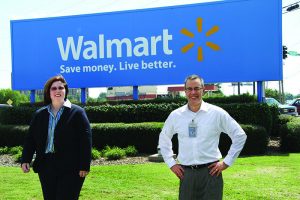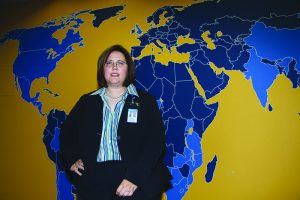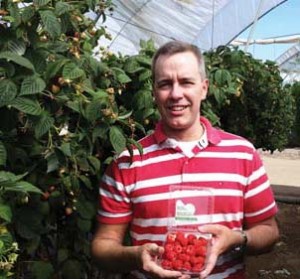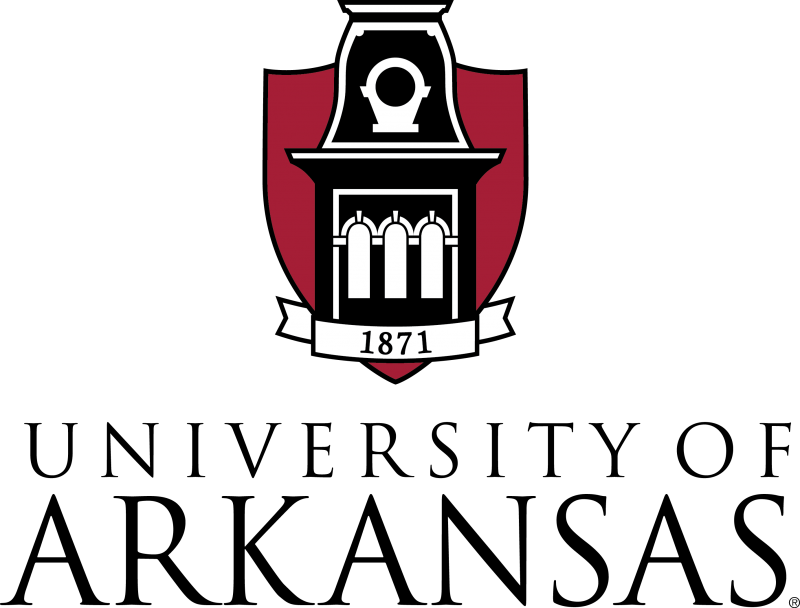
Big business can make a difference
Ami Spivey, BSIE 1995
Senior Vice President of International Business Processes
Ami Spivey grew up in Fayetteville. She hadn’t planned on going to the U of A until she spent an afternoon with industrial engineering department head Eric Malstrom and Neil Schmitt, dean of engineering at the time. She left convinced that studying industrial engineering at the U of A was the path for her.
As a student, Spivey began working as an hourly associate at Walmart, and convinced her supervisors to allow her to do an internship with the company. She also designed her own cooperative learning project. Spivey graduated with a Bachelor of Science in industrial engineering and a job offer from Walmart.
Spivey moved up the ladder quickly, and worked in a wide range of positions, from engineering to operations to transportation and finally, innovation. Though her career has been diverse, one thing remains consistent: Spivey’s commitment to learning from the people around her.
In Spivey’s first engineering position, designing an order-filling system for distribution centers across the country, she knew that listening to associates was the best way to optimize her system. “They know what the problems are and what the solutions are,” she explained.

“The culture is the same, but it’s how you apply it. What does respect for the individual mean in different markets? The teams need to role model the culture, be a student of the culture.”
– Amy Spivey
From there, Spivey switched to the operations side of the company and worked as a regional operations manager. After that, she started a distribution center in Pennsylvania, where she was responsible for operations, starting with hiring and training the employees and teaching them Walmart culture. On September 11, 2001, her team helped replenish supplies to Ground Zero.
Recognizing her leadership potential, Spivey’s supervisors asked her to move to transportation, where she supervised truck drivers. In this position, Spivey continued to learn from the people she worked with. She explained that the drivers had a lot of ideas. “And usually they’re right,” she said. “They taught me a lot about leadership. They taught me to listen.”
Sustainability became a part of Spivey’s job when fuel prices started going up in the mid 2000’s. Drawing on her engineering skills, Spivey led a team focused on moving more cargo with less driving. An environmentalist she was working with told her that this project would have a bigger effect than everything else she had worked on in her 20 year career. “That job opened my eyes to the impact we can have,” Spivey explained. “Big business can make a difference.”
After that, Spivey was asked to start an innovations engineering team at Sam’s Club, finding new ways to provide the best customer experience. In her current position, Spivey works in innovations on an international scale. She helps Walmart stores and Sam’s Clubs around the world find and implement best practices.
Spivey explained that her teams must understand and value the culture of the countries they work in, while practicing Walmart cultural values–respect for the individual, taking care of customers, striving for excellence, and a foundation of integrity—in a way that makes sense for that country. “The teams need to model our culture while being a student of the country’s culture,” she explained.
Spivey is a proponent of co-ops and internships for students, because she credits her education and early work experience with preparing her for her career. As a member of the Arkansas Academy of Industrial Engineering, she serves on a committee focused on providing global experiences for students, and she also provides international work experiences for students through her job.
When Spivey was growing up in Fayetteville, she thought she would have to leave the area in order to experience the world. She never suspected that she could do both; that going to the U of A and getting a job at a local company would propel her into a global career.
Eat What You Cook
Chuck Tilmon, BSIE 1994, MSIE 1995
Vice President of Global Food Sourcing, West Coast
Chuck Tilmon has always been a Razorback. Growing up in Texarkana, he was an Arkansas High School Razorback. When he went to college, he chose the U of A, the alma mater of both his father and grandfather and the school where his sister, Jennifer, was earning a chemical engineering degree.
Tilmon’s experience as an engineering student was very influential. As a senior, he took a course from John English, who became his adviser when he pursued his master’s degree. From English, Tilmon learned how to work with a team and how to break a large project down into smaller tasks. He also has good memories of Eric Malstrom. “He had a positive style of listening and taking ideas and helping to reformulate them,” Tilmon remembered.
When Tilmon graduated, he had many career options. He chose to work in logistics, and worked for Arkansas Best Corporation and then for J.B. Hunt. In 2002, he began working at Walmart as a merchandise logistics manager. Next, Tilmon moved to supply chain strategy, then replenishment, making sure that inventory was at the right level from supplier to distribution center to the store.
While working in this role, Tilmon received the 2012 Grocery Merchant Business Partner of the Year Award for the work he did preparing his replenishment team for growth in the produce area. The experience he gained in that job led to his current role. As vice president of global food sourcing, Tilmon oversees the distribution of produce from California to Walmart stores across the United States.

“When it comes to produce, we work with the people who started the company or their sons or daughters. They’re proud of their heritage.”
– Chuck Tilmon
Tilmon’s favorite part of his job is visiting the growers in the field. He explained that a quarter of the produce we eat in the United States comes from California, and much of this is grown on family farms. “We work with the people who started the company or their sons or daughters,” he explained. “They’re proud of their heritage.”
The son and grandson of farmers himself, Tilmon loves to put on jeans and a t-shirt and “kick the dirt” with farmers. The summers he spent on his father’s farm have given Tilmon insight into the challenges farmers face, such as rain, labor and price fluctuations.
Organic produce also presents new challenges. Tilmon must work to make sure organic products are affordable while balancing the fact that it costs more to produce. Another challenge is drought. Tilmon explained that Walmart hopes to build sustainable processes to conserve water in the area, and to influence other industries to do the same.
Though he lives on the other side of the country, Tilmon remains connected with his alma mater. He was inducted into the Arkansas Academy of Industrial Engineers in 2011, and he is working with the department to resurrect the IIE organization he was part of as a student. He also participates in mock interviews, helping students learn to present themselves well as they look for a job.
Tilmon’s job has made him look at food differently. “Food is a very strategic area for the country,” he explained. “Where do we get it? How do we source it? How do we make it affordable?” Walmart associates are advised to “eat what you cook,” to experience the systems and processes they develop first hand. Since moving to California, Tilmon has started paying more attention to the food he eats, and eating a lot more fresh fruits and vegetables. His work in produce has also connected him with his past. “It reminds me of my summers on the farm,” he explained.
